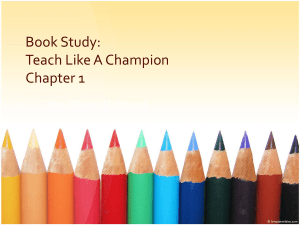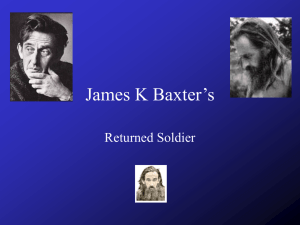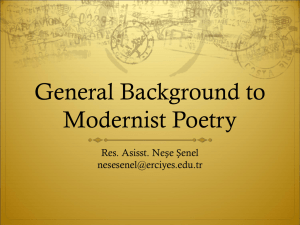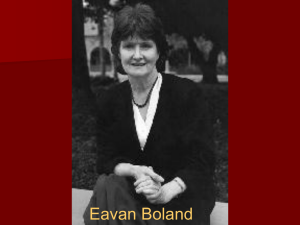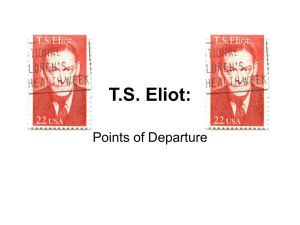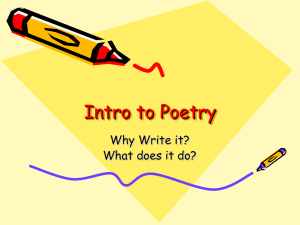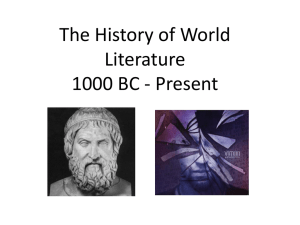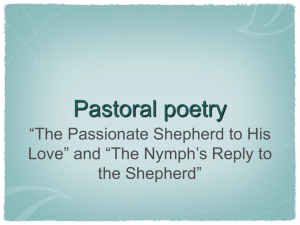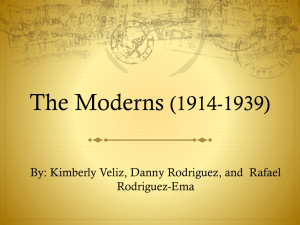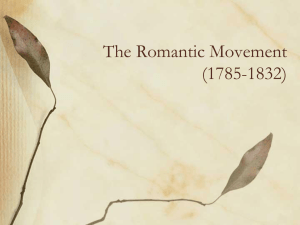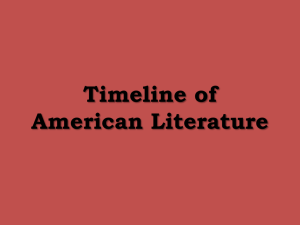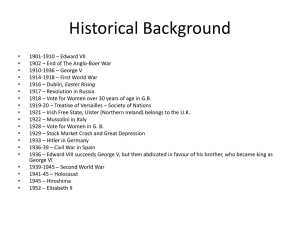A Brief History of English Poetry
advertisement
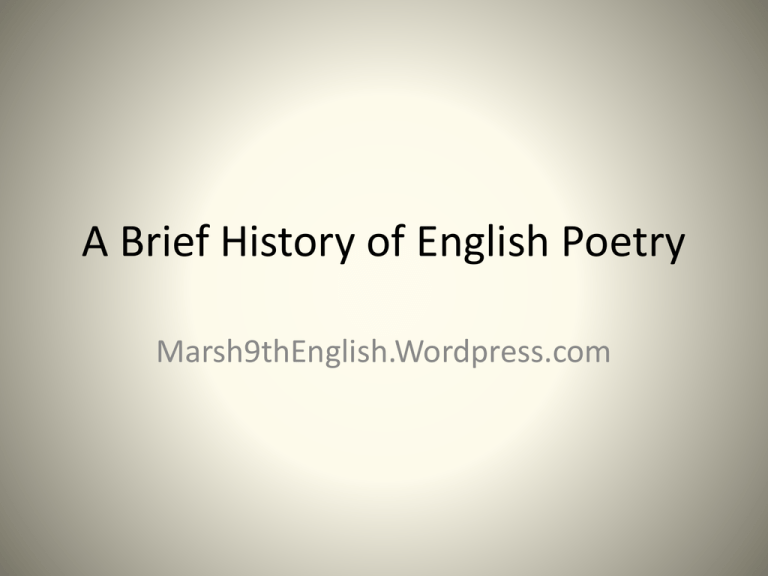
A Brief History of English Poetry Marsh9thEnglish.Wordpress.com Major Eras of British/American Poetry • Elizabethan • Romantic • Victorian • Modernist • Post-Modernist 1558-1603 ELIZABETHAN PERIOD Elizabethan Age • The reign of Elizabeth I was also a turbulent period, but she successfully coped with all the difficulties. England was threatened by the superpowers of the age – France and Spain. Elizabeth was excommunicated by the Pope in 1570. She was in constant fear for her life. Nevertheless, English ships beat the Spanish Armada in 1588. Elizabeth managed to maintain a relative peace between the protestants and the Catholics. She tried to unite her people, instilling a sense of national pride. The Best Elizabethan Poetry • At the time, the writing of poetry was part of the education of a gentleman. Sonnets were very popular among the upper classes, and collections of sonnets and lyrics were often published. Aristocrats who did not write poetry themselves were usually patrons to other poets, giving them financial support. Shakespeare • W. Shakespeare was one of these poets • Collection of sonnets (1609) is dedicated to his patron • Scholars are not certain when each of the 154 sonnets was composed, but evidence suggests that Shakespeare wrote sonnets throughout his career for a private readership. What Is Romanticism? • Use creative imagination • Focus on nature • Importance of myth and symbolism • Focus on feelings and intuition • Freedom and spontaneity • Simple language • Personal experience, democracy and liberty • Fascination with past Revolt Against Neoclassicism Neoclassic Trends • Stressed reason and judgment • Valued society • Followed authority • Maintained the aristocracy • Stressed imagination and emotion • Interested in science and technology • Valued individuals • Strove for freedom • Represented common people • Interested in supernatural Romantic Trends Poets of the Romantic Era • William Blake • William Wordsworth • Samuel Taylor Coleridge • George Gordon, Lord Byron • John Keats • Percy Bysshe Shelley Blake Wordsworth Coleridge Shelley Byron Keats William Wordsworth 1770-1850 • Born in Cockermouth, Cumberland, England • Mother died 1778 • Attended St. John’s College, Cambridge • Had affair with Annette Vallon • “Vaudracour and Julia” for lover and daughter • Married Mary Hutchinson • Five children • Lived with sister Dorothy • Brother John died at sea • Lost friendship with Coleridge • Two children died • Granted honorary Doctor of Civil Law degrees The Victorian Age (1832-1901) • Queen Victoria 1837-1901 • 1. Full of conflicts and tensions • Anxiety in Arnold’s poetry→a strong sense of loss. • Existential concerns • Tennyson→relies on religion→the last Christian Poet in English literary history Alfred, Lord Tennyson • Alfred Tennyson was born August 6th, 1809, at Somersby, Lincolnshire: – Parents: George and Elizabeth (Fytche) Tennyson. • fourth of twelve children • Grandfather made his younger uncle heir and skipped over Tennyson’s father • Lifelong fear of mental illness • 1827 Tennyson he followed his two older brothers to Trinity College, Cambridge • 1829 - The Apostles – an undergraduate club – remainedTennyson's friends all his life – met to discuss major philosophical and other issues Lewis Carrol (27 January 1832 – 14 January 1898) • Real name: Charles Lutwidge Dodgson • Wrote under pseudonym Lewis Carroll • Author, mathematician, logician, photographer, and Anglican deacon. • Most famous writings are Alice's Adventures in Wonderland and Through the Looking-Glass, as well as the poem "Jabberwocky", • all examples of the genre of literary nonsense. • Noted for his facility at word play, logic, and fantasy, Carroll’s Alice Through the Looking Glass • the author's mathematical forays into the realm of symbolic logic make his work a natural precursor to modernism. • His interest in the possibilities of language look forward to Joyce • His fascination with sign systems in the Alice books makes him a forerunner to contemporary approaches to the field of semiotics (the study of meaning) Themes • Tennyson is sceptical about man's capacity to have and keep faith: – the destruction of an ideal when men do not keep faith: • "The Passing of Arthur,“ – makes it quite clear how the Round Table failed – offers some cause for hope: » presents the trials, triumphs, and conversion of the ordinary man: » Sir Bedivere. American Poetry during the Victorian Age *Victorian era applies mostly to British writing at the time *Also known as Post-Colonial *While authors such as Whitman and Dickenson are writing, they have little acclaim outside of U.S. Edgar Allen Poe • • • • • Born in Boston, Massachusetts, on January 19, 1809 Married cousin while editor in Richmond, VA Invented horror writing and detective fiction Precursor of “art for art’s sake” movement One of first American fiction authors to gain worldwide acclaim Modern Poetry • In modernism, we see poets breaking the rules of gentlemanly Elizabethan poetry, and forming new definitions of what makes a poem interesting. No longer did poetry have to follow rules about rhythm, rhyme, and meter. Poetry from this era ranges from small poems about an image (see E.E. Cummings), to long, sprawling epics written in several languages (see T.S. Eliot). For more examples of 20th and 21st century poetry, see below: T.S. Eliot: 1888-1965 • Was extremely studious- he studied in Harvard AND the Sorbonne in Paris! • Pioneer of “high modernism” (a.k.a. hard-to-understand poetry) • His poetry usually has a depressing tone. • Liked to use Italian, Greek, Russian, French, and German in his poems- because he spoke nearly all of them! Langston Hughes • 1902-1967 • Is considered a “Harlem Renaissance” Poet- he was an African American that was one of the first of his race to be a published and respected poet. • His poetry has been set to jazz music Naomi Shihab Nye • Contemporary poet (still alive today) • Literature Professor at University of Texas • Writes simple poetry which documents the day-to-day life of modern America
